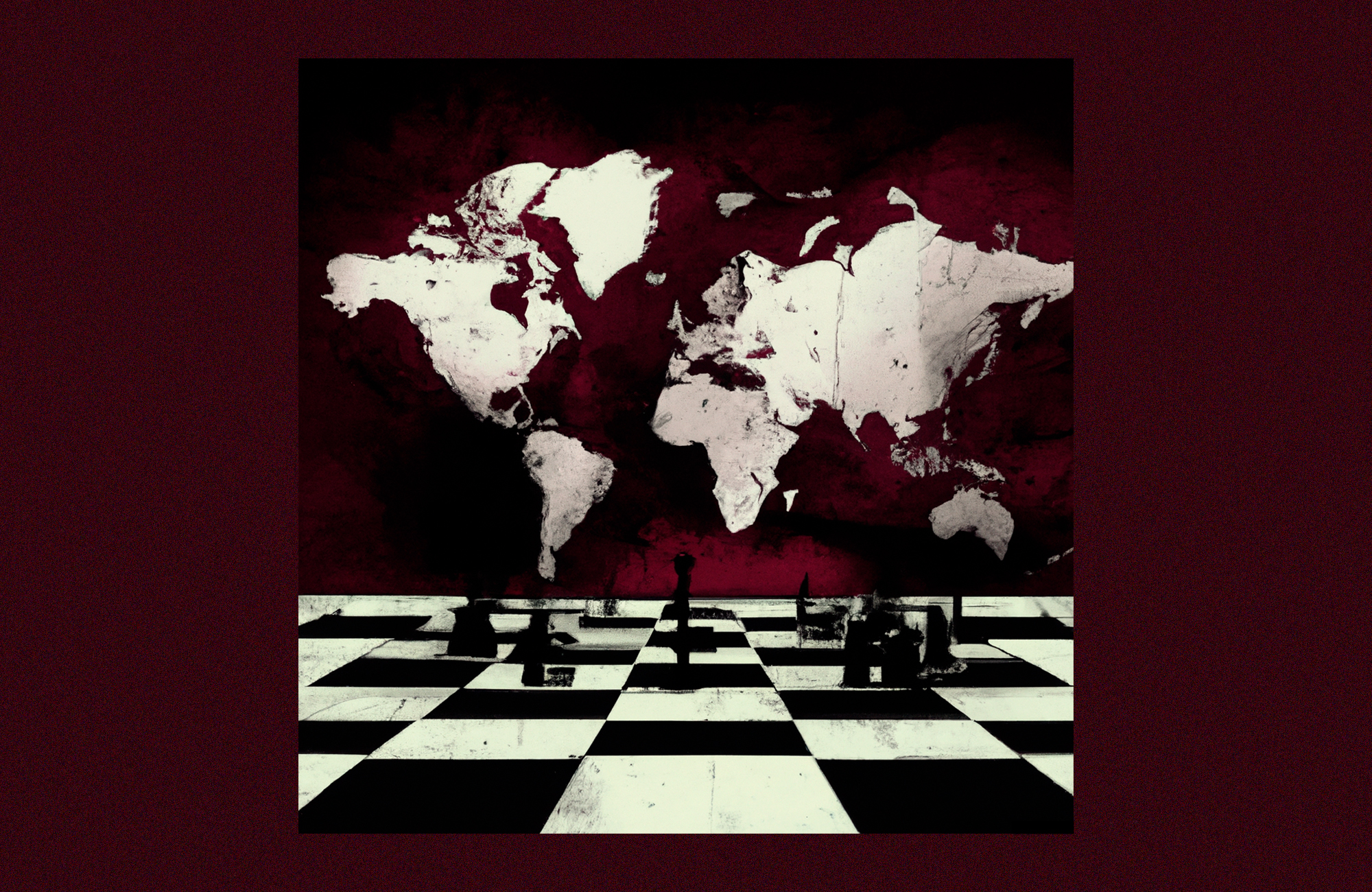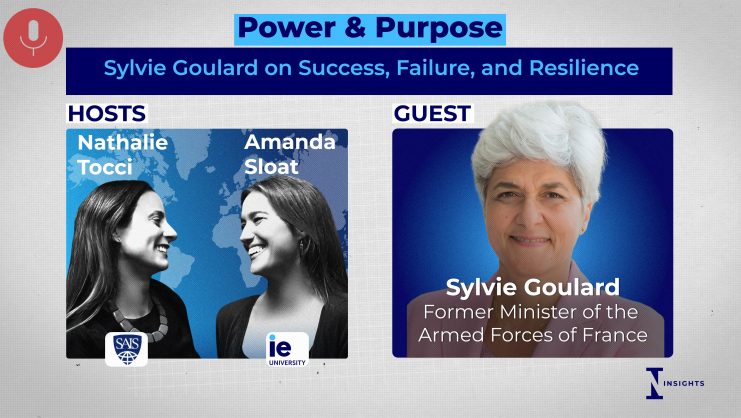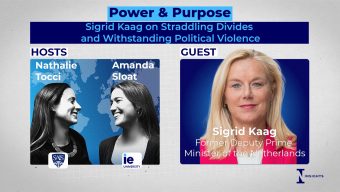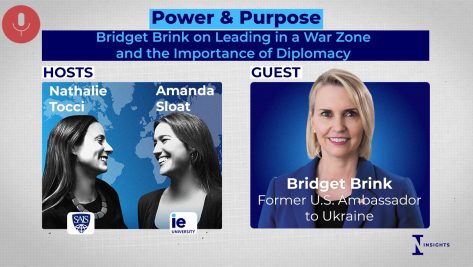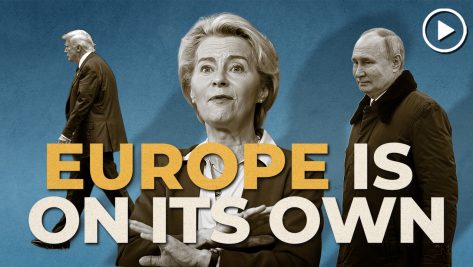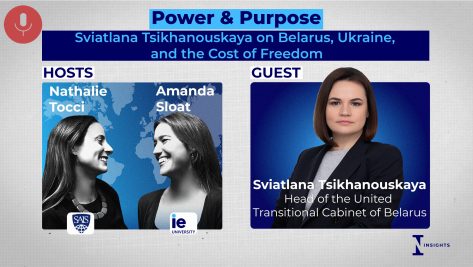Maxim Mironov, Economist, Professor of Finance, IE Business School:
There has never been an instance in history when a country with a large nuclear arsenal has fought a full-scale war and has threatened to use those nuclear weapons. The atomic bombings of Hiroshima and Nagasaki are completely different from the present situation, there’s no comparison – and thus no data to gauge these current events. So, it’s useful to examine this situation from the political economy and game theory perspective, to analyze the behavior of the “players” (i.e. the parties in the conflict), to assess possible strategies for their behavior, and weigh the pros and cons of these strategies.
Georgy, what is your take on the situation? What are the strategies Putin, the United States and other Western countries, as well as India and China, are pursuing? What actions might prevent the worst-case scenario and deter Putin from using nuclear weapons?
Georgy Egorov, Game Theorist, Professor at the Kellogg School of Management:
If we analyze the context in terms of political economy and game theory, we first need to define the goals of the players before we start on their strategies. We can’t talk about what Putin will do and how to prevent it without first understanding what Putin wants to achieve – the probability of the outcome he is maximizing, to use game theory terms. There is a great degree of uncertainty here. We have research on what politicians want in non-democratic countries. The question is whether this is 100% applicable to Putin.
For example, if we believe that Putin aims to stay in power as long as possible, then he has been maximizing this outcome rather poorly, at least in the past year. To achieve this goal, he should have continued with the policies of the last seven years, gradually seeking the lifting of sanctions in exchange for some kind of concessions in Donbas, within the framework of the Minsk agreements or similar. But this is clearly not what Putin has done.
In all likelihood, Putin’s aim is glory. He seeks to be known in history as the “collector of lands,” as the ruler who increased the size of Russia’s territories. He strives to be anti-Gorbachev and anti-Yeltsin, aiming for Catherine the Great. Needless to say, I don’t think he’ll go down in history in the way he pictures himself. But, given the current situation, the question is how do these two desires – to stay in power and achieve some kind of territorial conquest – fit together?
If we assume that full annexation of Ukraine is no longer an option for Putin, the next question is what does he consider to be an acceptable retreat? I personally can’t quite see how he can secure his place in history if he simply annexes the territories now controlled by Russian troops in Ukraine. This won’t bring him much glory. So, what are his options now? As you can see, it is quite difficult to imagine what Putin might be thinking.
MM: Let me try to put myself in Putin’s shoes. In theory, it is possible to rationalize what is happening, following the assumption that Putin is maximizing his time in power. Yes, he made an inherently questionable decision, but perhaps he simply had the wrong information, the wrong premise. If we look back, the annexation of Crimea brought a huge increase in his popularity and, for at least five years, it completely eliminated any threats from the opposition. Shortly before Crimea, Alexei Navalny almost became Mayor of Moscow – and he would have in fact, had it not been for electoral fraud. Putin’s popularity was falling. And the solution, in the form of Crimea, boosted his popularity for five or six years, after the protests of 2011–2012.
More recently, Putin has suffered other setbacks. First, the 2018 pension reform, which decimated his popularity. Then, in 2020, the failure, to put it mildly, to minimize the effects of the Covid pandemic. In early 2022, Putin’s popularity remained stagnant. Perhaps he considered his army to be the second-best in the world when he triggered this war. And a lot of other people did too, including many people in the US, who predicted that Kyiv would fall in three to four days. These may have been the estimates Putin had been given, and may have been the same ones used by US intelligence. You can imagine Putin thinking before the war: “It won’t take me long to invade Ukraine. What is the West going to say? They will simply voice their concerns, impose sanctions on a handful of people, and that will be the end of it.”
But now he realizes that he has lost and is slowly sliding towards bankruptcy. If he leaves things as they are, he will be carried out feet first or, at best, put in prison. This is why he can now raise the stakes. War mobilization only brings a small increase in the chances of success, at the expense of economic development and human lives. But it’s worth it because if he wins, he stays in power; if not, he loses power. It could be the same story with a tactical nuclear strike: it is a way for him to put even more at stake. How’s that for an explanation for what Putin might be thinking?
“A nuclear strike would only make sense if Putin only has a few months to live.”
GE: Great. In fact, it would be even more plausible if we substituted “Putin” for “the elites.” It is even more important for the elites to maintain their power and property than it is for Putin. No monuments will be put up for the elites for the annexation of land, though there could be a monument or two for Putin. Let’s talk about what the elites need to do to retain power. To me, it is quite clear that escalation and threats are the wrong way to go, as is the use of nuclear weapons.
In fact, this kind of escalation only makes sense for Putin personally and only in one situation: if the rumors about his health problems are true, i.e., if he only has a few months to live and doesn’t want to go down in history as a loser. In that case, it makes sense for him to escalate, to try to make it through the winter at all costs, to stabilize the situation on the fronts. Then he will die like Franz Joseph of Austria and the war will be lost by someone else.
In this scenario, I can understand why he would be taking this course of action. Otherwise, if he was working off of a 10, 20, or 30-year timeline, his strategy would be completely different.
Also, we can’t assume that a lost war means a loss of power. For example, Russia lost the Russo-Japanese War, which was followed by a revolution, but the Tsars remained in power, though they did make political reforms. The same happened in 1991 with Saddam Hussein, who would still be in power if George W. Bush had not finished him off. Therefore, it is totally false to assume that an autocratic regime that loses a war inevitably loses power.
If this is the case, the question is: “How do you lose a war without losing power?” And I suspect that dropping nuclear bombs to achieve that goal is not seen as a good strategy. Instead, the different elite groups all need to be weakened evenly: the different security services, the FSB, Chechen leader Ramzan Kadyrov, and others, so that when peace comes none of these groups ends up being stronger than the others. A “soft-landing” strategy is needed to lose the war without losing power.
MM: So, you are dismissing my strategy of needing to stay in power, from Putin’s point of view? You think that even though he initially overestimated the strength of his army, he would be better off now to soft pedal on everything and push for a truce, even making concessions on territories that are already under his control, and trying to mothball Russia as a large-sized North Korea.
GE: Sort of. Let’s delve more into nuclear weapons in general and the meaning of their use.
MM: Yes, all right. But, if we go back to the idea that Putin’s strategy is to go down in history as “Putin the Great” like Catherine and Peter, as a “collector of Russian lands,” then that explains both the war mobilization and the raising of stakes in the future.
Oleg Itzhoki and I co-authored an article and proved that there are not that many people in Russia who can be called up. They are all trying to avoid the draft, which is a perfectly normal strategy. There are reports that 200,000 people have already been recruited. But even if another 300,000-400,000 are drafted, even up to 700,000 people, this will not solve the problem but only postpone the agony. What will happen if the Ukrainian army simply wipes out those 700,000 or a million people, given the power of modern weapons? Will Putin say, “I’m tired, I’m leaving” or will he seek a stalemate? What is his next step, what will he do?
GE: Mobilization as a delaying strategy could certainly work, and so could nuclear weapons. But the issue is whether the main strategy is postponement. It doesn’t prevent defeat in the end. I am skeptical about nuclear weapons, including their demonstrative or real use.
For example, there was Hiroshima and Nagasaki. After that, everyone quickly realized that nuclear and thermonuclear weapons are far more powerful than necessary for the battlefield and that, in fact, they are actually strategic weapons. Therefore, the main purpose of nuclear weapons throughout the Cold War was as a strategic deterrent through the assurance of mutual destruction. So, other countries, including India, Pakistan, and North Korea, have been developing nuclear weapons so they can have a deterrent. The basic paradigm has been that nuclear weapons are weapons of deterrence.
Now where does the idea that nuclear weapons can actually be used come from? For example, what is the point of the Gerasimov Doctrine, calling for “escalation for the sake of de-escalation”? It’s an interesting game theory challenge. During the Cold War, for example, the West was petrified that the USSR would march against Western Europe a bit at a time, following the so-called “salami strategy.” They would capture one city, and then another one, but it wouldn’t be worth destroying the entire planet for one individual loss.
MM: It’s also been the West’s main concern in the current conflict and why they didn’t establish a no-fly zone over Ukraine in the first days of the war. In fact, it appears that under international law, no one can stop Ukraine from asking NATO to enforce a no-fly zone. But the concern in the West was that it could be interpreted as NATO joining the war and so they decided not to set up this zone. No one is saying Putin will point a missile at London or the US. Rather, he will say: “Now, to save the lives of Russian soldiers, I’ll…” It will be sold as a tactic to scare Ukraine, i.e. “Are you sure that the West will cover your back, assuming that nuclear weapons act as a deterrent? Do you think they are willing to play this game when they were afraid to enforce a no-fly zone?”
GE: In fact, it’s important to ask, in all of this: who cares more about not losing? When Putin says that he will use nuclear weapons because “why would anyone want a world without Russia?”, we believe him, because we understand that preserving Russia as a state is a major priority for him. You can imagine how the “escalation for the sake of de-escalation” strategy works in the case of a defensive war. For example, if NATO troops take Pskov and approach Novgorod and Russia detonates a nuclear bomb, they will probably think: “Why do we need Novgorod? Maybe we’d better withdraw, we don’t really need this land.”
However, things don’t work like that in an offensive war. You can’t just march up to the borders of Poland, detonate a nuclear bomb and say: “That’s it, Polish government, off you go to Pomerania. Warsaw is ours.”
MM: Isn’t that the reason why all four regions were formally annexed to the Russian Federation, so that now, when Ukraine recaptures Liman or Kherson, Russia can go on the defensive and say: “These are our ancestral lands! Ukraine will now occupy Russian Kherson, so we have the right to defend Russia’s existence! Whether it is Kherson, Novosibirsk, or Barnaul, they are all our beloved Russia!” Was this not the rationale behind Russia’s actions?
GE: Yes, but this was a narrative to feed the poor. Now, no one believes that this is ancestral Russian land: not the West, not the Ukrainians, not even Russian propagandists. While Defense Ministry reports still refer to the allied forces of the DNR and LNR as being separate entities to Russia, there has been no joining of forces so far. Moreover, the West understands that not even Putin himself fully believes this.
Declaring certain territory as Russian does not convert an offensive war into a defensive one. Ukraine’s desire to regain its territories is strong. The sense of an existential threat from Russia, personified by Putin, is not decreasing – so their desire to defend themselves remains intact. It is not as if Ukraine has announced “We have taken back all our territory and now we are going to go as far as Taganrog and Rostov.” That would be a very different story.
So, let’s say Putin, as part of what we still consider an offensive war, drops a nuclear bomb. Either onto the advancing Ukrainian forces, or into the Black Sea, or into the Baltic Sea to black out Scandinavia…
MM: No, he doesn’t dare threaten NATO, even with conventional weapons. But I also think Putin still believes that the West won’t stick its neck out for Ukraine if it will bring significant risks to the West’s citizens.
But what do you think will happen if the Ukrainian army continues its offensive and retakes all of the occupied territories, including Crimea? Right now, it is slowly getting there. It does not look like Russia will be able to organize an effective defense. What happens when Ukraine takes back Crimea? Will Putin just sit back and keep talking about expelling the fascist junta or will he dish up something else? What could he come up with so that he doesn’t lose the war? Or do you think he’s ready to lose and simply admit that Crimea is not Russia anymore?
GE: He is going to lose the war. The question is when and whether he’ll live to see it. I don’t think there is any way for him not to lose the war.
MM: I quite agree with you, but how many people is he prepared to kill along the way? Do you think that he’ll be ready to lose and not raise the stakes again? That the mobilization was his last big move and he’ll just admit that he’s lost? I don’t really believe he only has a few months left to live. I haven’t read a reliable source that predicts his death. So, I would dismiss this idea.
GE: Good, so much the better for world peace! Because, really, the only reason he would use nuclear weapons is to postpone Russia’s defeat to a point when he is no longer around. If his timeline is longer then that’s good. Imagine Russian troops attacking, say, Kherson. Putin prepares a nuclear bomb and detonates it over the Black Sea or…
MM: Lviv, for example. Imagine he drops a small nuclear bomb on Lviv.
GE: If it’s Lviv, that will be rather unpleasant for Europe…
MM: Precisely his goal: for nuclear contamination to spread to Poland and to other countries. So, while there will be no direct destruction in Europe, the small radioactive cloud from the detonation would make Europe very nervous. Putin already tried to end the war more quickly by blackmailing Europe with a food crisis – and failed. Then he cut off gas supplies to Europe. So now Putin is thinking: “I don’t have any more weapons except for these nuclear bombs. But I don’t want to lose, so I’ll drop bombs over Ukraine now and then and Europe will just have to put up with occasional nuclear rain.”
GE: So what happens next? The Ukrainians’ momentum is not waning. Their desire to get rid of Putin and the Russian threat will only grow. The same is true for the Baltic and Eastern European countries, for Finland, for all those who are afraid of Russia. Their reason to help Ukraine to put an end to the war is not going to change – and as for the Western countries, let’s say the UK and America, they will be horrified but they will not be directly affected. If we consider that it is impossible to bomb London, then the UK will suffer no direct harm.
MM: Bombings of London are physically impossible until the West decides to get rid of Putin. I was listening to Leonid Volkov – Alexey Navalny’s chief of staff – who reckons that if Putin uses nuclear weapons, a non-nuclear missile will fly into his bunker and kill him on the spot. This threat has allegedly been explained to Putin. I think if the Russian missile defense system detects a missile, countermeasures would be taken and a return attack would be launched. This makes me think that the West won’t be launching missiles into Putin’s bunker even if he uses nuclear weapons. Therefore, how can the West restrain Putin?
GE: Sending a missile into Putin’s bunker is unlikely.
Let’s say that a Russian nuclear bomb goes off, scaring off the US and Western Europe. The worst thing that could happen is that supplies of certain technologies or weapons, such as HIMARS, would grind to a halt. What would this lead to? It would make it harder for the Ukrainian army to fight and the balance of forces on the battlefield would change. The situation would become that of a long war with a front line that barely moves. Who would benefit from this?
So, this brings us back to the previous point. If we have Russian elites or Putin personally trying to sit it out or wait for a change of power – in the US for example – then it makes sense to freeze the conflict. If you are trying to find a way out of this situation for Russia, I see no point in using nuclear weapons other than to postpone a military defeat. And what is more, if nuclear weapons were used, the conditions for peace after defeat would be much, much worse because the West would not negotiate and there would be no opportunity to restore economic ties, agree on debt restructuring, reparations, and so on. In short, the use of nuclear weapons postpones the defeat, yes, but it also increases its cost.
The main driver for Putin to not use nuclear weapons is not the reaction of the West but the risk of India and China breaking off relations with Russia.
MM: I have heard the opinion, and would even agree, that the main driver for Putin to not use nuclear weapons is not the reaction of the West but the risk of India and China breaking off relations with Russia. Don’t you think it would be much more effective if his Chinese or Indian friends were to call Putin and tell him, “If you use nuclear weapons, we will join the trade embargo.”? Perhaps Putin should be bargaining with these countries, not with the West?
GE: We can’t rule out that such bargaining isn’t already going on, but it doesn’t even matter whether it has been said or not. I think that Russia’s use of nuclear weapons in an offensive operation is a big problem for India and China. Why? Because both have developed nuclear weapons precisely for nuclear deterrence. For them, it is important that non-use of nuclear weapons serves as some sort of guarantee. What does China need nuclear weapons for? So that there is no attack from the United States. What are India’s for? So that there is no attack from China, or at least that any attack doesn’t go beyond the disputed territories in the Himalayas. If nuclear weapons turn from being a deterrent to a conventional weapon, it does not devalue nuclear weapons altogether but it changes the strategic and military balance of those countries.
It would be a huge nuisance for both China and India’s needs if Putin decides to use nuclear weapons and so they would want to punish Russia as severely as possible. Whether they will actually take such a step in the end is another matter – who knows? But it is probably one of the things that could hold Putin back.
MM: So, assuming that Putin is a rational agent and is not going to die within the next few months, then he has no reason to use nuclear weapons. For one thing, it will not frighten the Ukrainians. It might scare the West into stopping support of Ukraine, but that will merely postpone Russia’s defeat. Furthermore it would get Putin into trouble with India and China, which will be very bad for him, because they are his last (if not allies then at least) trading partners, who help to keep Russia’s economy afloat.
GE: Yes, exactly. If Putin or his inner circle comes to realize that this war is lost, they need to somehow rationally minimize the costs and leave room for negotiation – and in those talks they would even say that they did not use nuclear weapons, although they could have. I think that the hope that nuclear weapons will not be used makes for a fairly optimistic note on which to end our conversation.
A version of this conversation was originally published in Russian in Novoya Gazeta.
© IE Insights.



